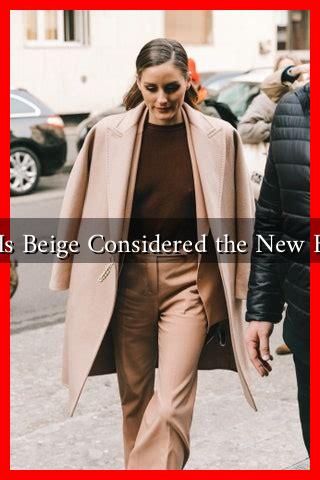-
Table of Contents
Why Is Beige Considered the New Black?
In the ever-evolving world of fashion and design, colors play a pivotal role in shaping trends and influencing consumer choices. For decades, black has been the go-to color for its versatility, elegance, and timeless appeal. However, in recent years, beige has emerged as a strong contender, often dubbed “the new black.” This article explores the reasons behind this shift, examining the cultural, psychological, and practical aspects that have contributed to beige’s rise in popularity.
The Cultural Shift Towards Neutral Tones
As society becomes increasingly aware of the impact of consumerism and fast fashion, there has been a noticeable shift towards minimalism and sustainability. Beige, with its neutral and understated qualities, aligns perfectly with this cultural movement. Here are some key factors driving this change:
- Minimalism: The minimalist lifestyle emphasizes simplicity and functionality. Beige, as a neutral color, embodies these principles, making it a popular choice for those looking to declutter their wardrobes and lives.
- Sustainability: Many consumers are now prioritizing sustainable fashion. Beige garments often have a longer lifespan in terms of style, as they can be easily paired with various colors and patterns, reducing the need for frequent purchases.
- Versatility: Beige can be dressed up or down, making it suitable for various occasions. This adaptability has made it a staple in many wardrobes, from casual wear to formal attire.
The Psychological Appeal of Beige
Colors evoke emotions and influence perceptions. Beige, often associated with warmth, comfort, and calmness, has a unique psychological appeal that resonates with many individuals. Here’s how:
- Warmth and Comfort: Beige tones are reminiscent of natural elements like sand and earth, creating a sense of grounding and stability.
- Calmness: In a world filled with chaos, beige offers a soothing alternative to bolder colors, promoting a sense of tranquility.
- Inclusivity: Beige is often seen as a universally flattering color, making it accessible to a wide range of skin tones and personal styles.
Beige in Fashion: A Case Study
Several high-profile fashion designers and brands have embraced beige in their collections, further solidifying its status as the new black. For instance, the Spring/Summer 2021 collections from major fashion houses like Chloé and Hermès prominently featured beige tones, showcasing their versatility and elegance. These collections highlighted how beige can be both chic and practical, appealing to modern consumers’ desires for style and functionality.
Statistics Supporting the Trend
Recent market research indicates a significant shift in consumer preferences towards neutral colors, including beige. According to a report by Statista, neutral colors accounted for over 40% of apparel sales in 2022, with beige leading the charge. This trend is expected to continue as more consumers gravitate towards timeless pieces that offer longevity in both style and wear.
Conclusion: The Enduring Appeal of Beige
In conclusion, the rise of beige as the new black can be attributed to a combination of cultural shifts towards minimalism and sustainability, the psychological comfort it provides, and its versatility in fashion. As consumers increasingly seek out timeless and adaptable pieces, beige is poised to remain a staple in wardrobes around the world. The transition from black to beige reflects a broader change in consumer values, emphasizing quality over quantity and style over fleeting trends. As we move forward, it will be fascinating to see how this trend evolves and what new colors may emerge as contenders in the ever-changing landscape of fashion.

